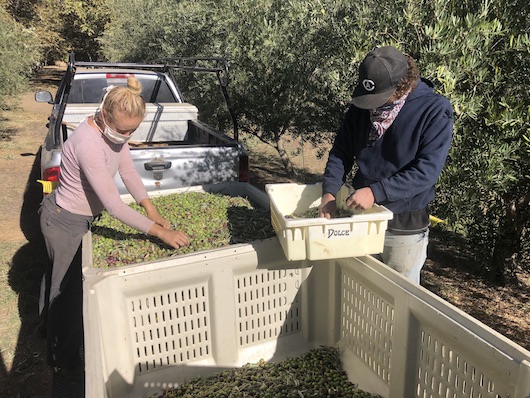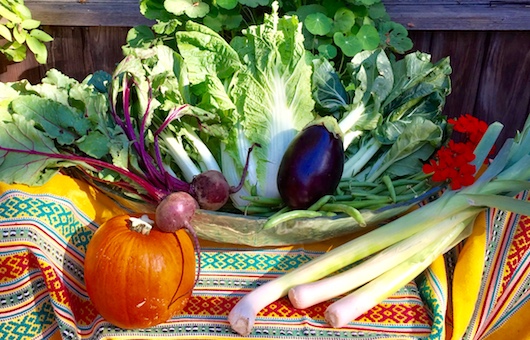
Harvesting Olives —
Living on a farm brings Nature’s timetable to the forefront of daily cycles. In the summertime much of the focus during the day is on selling, harvesting and packing the bounty from the fields. Now, in the early Fall we are still selling a lot of produce but pods of activity on the farm are devoted to various crop harvests that will hold us through the winter months and a lot of energy is devoted to getting fields planted and the farm prepared for the winter.
The big fall harvests on our farm include the two nut crops that we grow: almonds and walnuts. Next there are fields full of winter squash that we must pick up for storage in bins that are stacked one on top of the other in a barn. Finally, there is the olive harvest which was smaller this year because of a frost that killed some of the young fruit back in the spring. The olives were quickly processed into oil which will be available for sale soon.
When walnuts are harvested, they are covered with a dry hull or husk that cracks open when the walnuts are ready. One of the first parts of processing the walnuts is to remove the hulls. Once that is complete, we shell the walnuts — they will store better out of their shells. Every day, for several weeks there will be a group of people shuttling back and forth between the farm and our neighbor’s shelling machine turning bulky in-shell walnuts into boxes of shelled walnuts. It’s true that we could sell our nuts to a Co-Op and let someone else handle the processing and marketing, but with our crew in charge of the entire process, we can keep more people working during cooler weather and we are responsible for the storage of the crop all the way up to when it is sold and delivered.
We plan for our fields to be planted over the winter, either in crops or cover crops. Our soil is our future and we devote great energy to its care — it shouldn’t be left bare during winter rains which we hope will come our way. One of the crews that spent some time planting last week was our flower crew, thinking ahead to spring flowers. Here’s what was planted last week: snapdragons, godetias, nigella, canterbury bells, agrostemma, calendulas and sweet williams.
Excuse me, but the ever-lively, always lovely, enthusiastic, bright and colorful flower crew would put that as follows: Snapdragons! Godetias! Nigella!! Canterbury Bells! Agrostemma!! Calendulas! Sweet Williams!!! This crew has proved to everyone that sustenance from an organic farm comes from its beauty and its color as much as from its nutrition.
I will be at the Berkeley Farmers market on Election Day. I had volunteered to be a poll worker for Yolo County, but there are no polls… So we will sell our vegetables and see what the mood is. It has been consistently more somber than before the pandemic. Artists, actors, home-based workers and restaurant workers who have always been avid shoppers at the market now have no work and no sense of how the future of their careers will shape up.
When the pandemic struck many sustainable agriculture advocates realized that it would be a human-made disaster on top of everything else if there were no coordinated and scientifically informed response to the challenges. Farmers Markets and local food advocates responded well all over the country, trying to address the frightening increases in hunger. The pandemic has exacerbated a multitude of problems, from food insecurity at the individual and family level, to outbreaks in food processing and meatpacking plants, to disruptions in farm operations and food supply chains. Keeping people well fed has emerged as a key issue and has drawn attention to the vital role of local farmers, food system workers and food systems resilience in any community.
Both the farmers market and the CSA program seem to provide a provocative exposure to our local community. In terms of the CSA, we are getting several messages every week from members (sometimes people who have been members for decades) who have suddenly uprooted themselves and are moving out of California. I don’t remember ever experiencing this before in the CSA office. Every time this happens we make note. In March, we were deluged with people who were desperate to join. Now, eight months later we are seeing people who have endured the shelter in place and the smoky air and who are finding that they need to uproot, either for economic or family reasons. The messages often carry the same sense of panic that we observed back in March.
This rootedness in a community that our farm provides has taught us many lessons. For sure one of those lessons really is that we are in this together. It is that lesson that can provide a guide for me when we vote in this election. Be they politicians or propositions, if they appeal to class divisions or class interest or to other sorts of prejudice in the community, then it is likely that the folks behind said propositions or politicians are just furthering their own private interests rather than thinking of the common good. It is my fervent hope, one that I believe should shape our public discourse, that our leaders take that lesson to heart. Schools that prepare young people to thrive; medical care that treats all who need it equally; and strong, safe food systems are the foundation of a strong community. It seems fairly trite to state something so obvious and basic, but it is appears that even such basic values need to be kept front and center on Election Day this year.
Many blessing on your meals
—Judith Redmond

Relaxing in the Autumn Sun – By Maria Grazia
